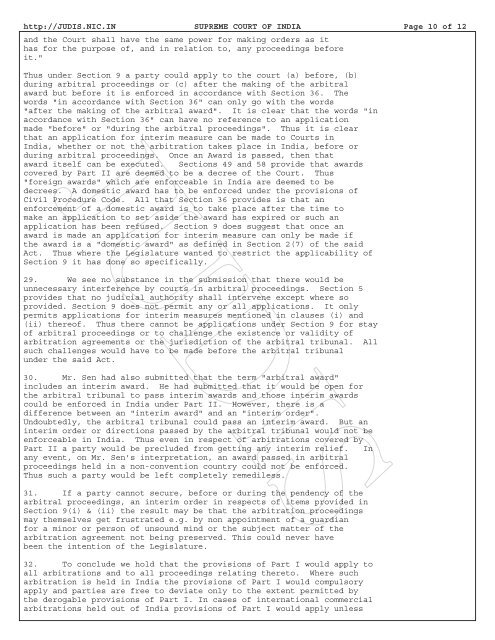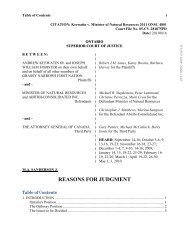Bhatia International v. Bulk Trading S.A. & Anr
Bhatia International v. Bulk Trading S.A. & Anr
Bhatia International v. Bulk Trading S.A. & Anr
Create successful ePaper yourself
Turn your PDF publications into a flip-book with our unique Google optimized e-Paper software.
http://JUDIS.NIC.IN SUPREME COURT OF INDIA Page 10 of 12and the Court shall have the same power for making orders as ithas for the purpose of, and in relation to, any proceedings beforeit."Thus under Section 9 a party could apply to the court (a) before, (b)during arbitral proceedings or (c) after the making of the arbitralaward but before it is enforced in accordance with Section 36. Thewords "in accordance with Section 36" can only go with the words"after the making of the arbitral award". It is clear that the words "inaccordance with Section 36" can have no reference to an applicationmade "before" or "during the arbitral proceedings". Thus it is clearthat an application for interim measure can be made to Courts inIndia, whether or not the arbitration takes place in India, before orduring arbitral proceedings. Once an Award is passed, then thataward itself can be executed. Sections 49 and 58 provide that awardscovered by Part II are deemed to be a decree of the Court. Thus"foreign awards" which are enforceable in India are deemed to bedecrees. A domestic award has to be enforced under the provisions ofCivil Procedure Code. All that Section 36 provides is that anenforcement of a domestic award is to take place after the time tomake an application to set aside the award has expired or such anapplication has been refused. Section 9 does suggest that once anaward is made an application for interim measure can only be made ifthe award is a "domestic award" as defined in Section 2(7) of the saidAct. Thus where the Legislature wanted to restrict the applicability ofSection 9 it has done so specifically.29. We see no substance in the submission that there would beunnecessary interference by courts in arbitral proceedings. Section 5provides that no judicial authority shall intervene except where soprovided. Section 9 does not permit any or all applications. It onlypermits applications for interim measures mentioned in clauses (i) and(ii) thereof. Thus there cannot be applications under Section 9 for stayof arbitral proceedings or to challenge the existence or validity ofarbitration agreements or the jurisdiction of the arbitral tribunal. Allsuch challenges would have to be made before the arbitral tribunalunder the said Act.30. Mr. Sen had also submitted that the term "arbitral award"includes an interim award. He had submitted that it would be open forthe arbitral tribunal to pass interim awards and those interim awardscould be enforced in India under Part II. However, there is adifference between an "interim award" and an "interim order".Undoubtedly, the arbitral tribunal could pass an interim award. But aninterim order or directions passed by the arbitral tribunal would not beenforceable in India. Thus even in respect of arbitrations covered byPart II a party would be precluded from getting any interim relief. Inany event, on Mr. Sen’s interpretation, an award passed in arbitralproceedings held in a non-convention country could not be enforced.Thus such a party would be left completely remediless.31. If a party cannot secure, before or during the pendency of thearbitral proceedings, an interim order in respects of items provided inSection 9(i) & (ii) the result may be that the arbitration proceedingsmay themselves get frustrated e.g. by non appointment of a guardianfor a minor or person of unsound mind or the subject matter of thearbitration agreement not being preserved. This could never havebeen the intention of the Legislature.32. To conclude we hold that the provisions of Part I would apply toall arbitrations and to all proceedings relating thereto. Where sucharbitration is held in India the provisions of Part I would compulsoryapply and parties are free to deviate only to the extent permitted bythe derogable provisions of Part I. In cases of international commercialarbitrations held out of India provisions of Part I would apply unless
















